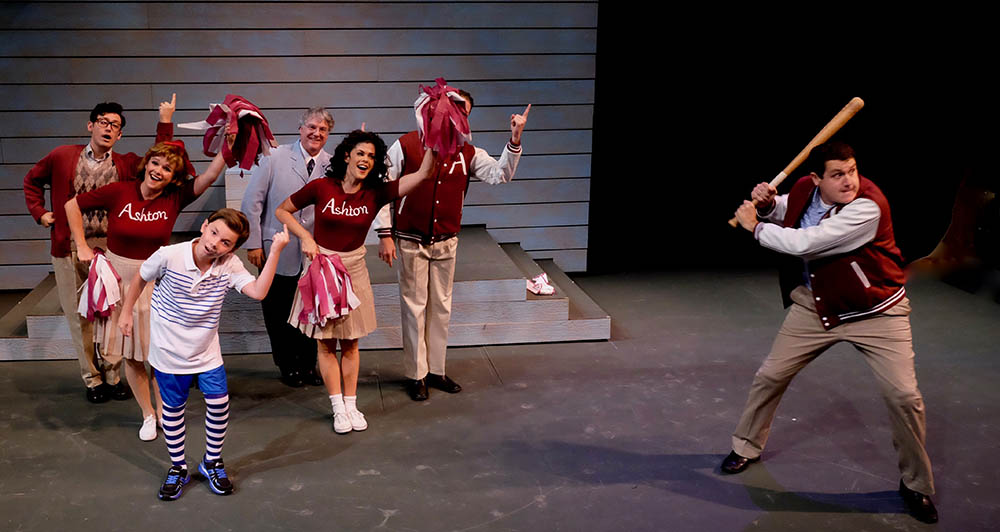Lamb’s’ ‘Big Fish’ Is Adrift in a Small And Untenable Pond

Never underestimate the power of a crystal ball, especially one in the hands of a witch (Anise Ritchie). COURTESY PHOTO
On and on the tales roll as a wary, estranged Will seeks reconciliation with Edward from the latter’s deathbed (cancer). He’ll get more than that, but Big Fish, latest entry from Lamb’s Players Theatre, misses a lot of what could have made this musical better. The tunes and lyrics are more persuasive than the dialogue, and director Deborah Gilmour Smyth knows her way around melody as well as anyone I’ve ever encountered.
But a hefty dose of ritualism, the kind that separates magic from the grit of day, evades the story with an almost intentional persistence.
A witch’s prediction of Edward’s death; Ed’s fantasy career in high school sports; the cavebound specter of a punch-drunk giant named Karl: The litany stretches ad infinitum, much to the amusement of Josephine, Will’s bride to be.
Amid Jo’s affection for Edward, Will strives to bury the hatchet with dad in order to discover his authentic side — and amid the revelation of a colossal act of kindness, Edward is finally the hero that Will admires.

Edward Bloom (Brandon Joel Maier, right) is the greatest high school ballplayer that never was. COURTESY PHOTO
The action is a case in point — it’s restricted to the theater’s ground-level performance space, even as Lamb’s has an excellent technical history involving flies and belowground entrances. It’s a mystery that a multidimensional story like this would find itself so firmly ensconced on planet Earth.
… [H]er Frenchness has absolutely nothing to do with the story.
Meanwhile, librettist John August (who also wrote the Columbia Pictures screenplay from 2003) doesn’t do himself many favors. Will has learned long ago that his chastisements of the prevaricating Edward fall on deaf ears — why, then, does he issue his latest admonition on his wedding day, of all things?
And as sweet as Josephine may be, she’s also unabashedly French — nothing wrong with that, except that her Frenchness has absolutely nothing to do with the story.
Too many holes here, most of which are products of August’s tardiness or his tendency to underwrite.
Edward isn’t the most likable guy in the universe — but Brandon Joel Maier does his best to assume his character’s inspirational side with “Be a Hero,” his theme song. Will’s lifelong study of his dad has defined itself in the character’s button-down, mopish mien, chiefly in “What’s Next,” which Michael Cusimano imbues with appropriate treatments.

Composer and lyricist Andrew Lippa has a lot to smile about. PHOTO BY SARAH ACKERMAN
Mike Buckley’s scene design is strikingly static for such a multilevel reality, while Jeanne Reith’s costumes (as always) double as reliable character sketches. Smyth’s and choreographer Javier Velasco’s work flank G. Scott Lacy’s good music direction — Lacy has the most to work with amid Andrew Lippa’s plaintive, thoughtful lyrics and tunes, and he’s got a crack seven-musician ensemble under him to boot.
But the test of any musical lies in its spirit of collaboration — and with Big Fish, that attribute is lacking amid the sparse characters and a musicianship and lyricism that dwarfs them ever further. “Thinking makes it so,” Shakespeare wrote, with Edward eagerly embracing the sentiment to a fault — one only wishes that August would have taken heed as well.
Martin Jones Westlin’s e-mail address is [email protected].
This review is based on the matinee performance of June 17. Big Fish runs through July 30 at Lamb’s Players Theatre’s resident stage, 1142 Orange Ave., Coronado. $37-$74. 619-437-6000, lambsplayers.org.
